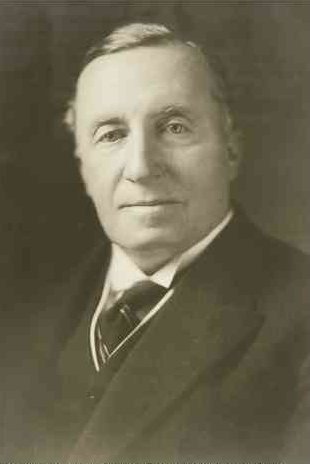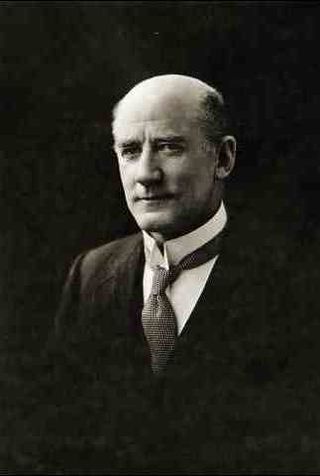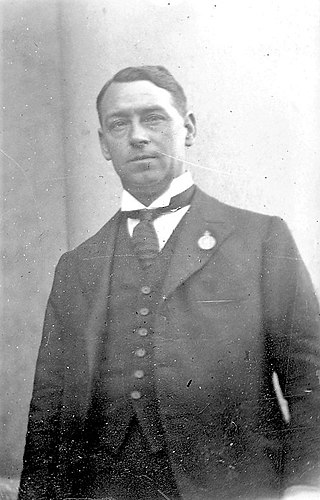
Sir Richard Butler was an Australian politician. He was a member of the South Australian House of Assembly from 1890 to 1924, representing Yatala (1890–1902) and Barossa (1902–1924). He served as Premier of South Australia from March to July 1905 and Leader of the Opposition from 1905 to 1909. Butler would also variously serve as Speaker of the House of Assembly (1921–1924), and as a minister under Premiers Charles Kingston, John Jenkins and Archibald Peake. His son, Richard Layton Butler, went on to serve as Premier from 1927 to 1930 and 1933 to 1938.
The Lyell McEwin Hospital (LMH) is a tertiary acute care hospital located in Adelaide, South Australia. It is one of the three major tertiary hospitals servicing the SA community. LMH provides comprehensive medical, surgical, diagnostic, emergency and support services to a population over 300,000 residents primarily in Adelaide's Northern and North Eastern suburbs. It is named after Sir Alexander Lyell McEwin.
Sir Gilbert Lawrence Chandler KBE, CMG was a Liberal Party politician who served in the Bolte Ministry in Victoria.
The 1937 Coronation Honours were awarded in honour of the coronation of George VI.

Sir Herbert Angas Parsons, KBE, KC, generally known as Sir Angas Parsons, was a Cornish Australian lawyer, politician and judge.

Sir George Ritchie KCMG was a South Australian politician. During his parliamentary career he held every ministerial position and was a minister in both Houses, a feat rarely equalled.

George McEwin was a gardener and orchardist in the early days of South Australia, remembered today as the founder of Glen Ewin jams and preserves.
The 1935 Birthday Honours for the British Empire were announced on 3 June 1935 to celebrate the Birthday and Silver Jubilee of King George V.
Alexander Wallace Sandford, often written A. Wallace Sandford or Wallace Sandford, was an Australian produce merchant and politician. He was the senior partner in the successful A. W. Sandford & Co. produce business, and was a member of the South Australian Legislative Council from 1897 to 1902. His eldest son, Sir James Wallace Sandford, was a prominent figure in South Australian public life.
The Royal Caledonian Society of South Australia was founded in Adelaide in 1881 as the South Australian Caledonian Society to promote Scottish culture and traditions in South Australia.
The King's Birthday Honours 1931 were appointments by King George V to various orders and honours to reward and highlight good works by members of the British Empire. The appointments were made to celebrate the official birthday of The King. They were published on 2 June 1931.
The King's Birthday Honours 1929 were appointments by King George V to various orders and honours to reward and highlight good works by members of the British Empire. The appointments were made to celebrate the official birthday of The King. They were published on 3 June 1929.

Sir Herbert Sydney Hudd was an Australian politician who represented the South Australian House of Assembly seats of Torrens from 1912 to 1915 for the Liberal Union and Alexandra from 1920 to 1938 and from 1941 to 1948 for the Liberal Federation and the Liberal and Country League.
Hart is a locality in the Mid North region of South Australia. The boundaries were formalised in January 2000 for the long established name for the area. There was a railway siding at Hart on the Gladstone railway line until it closed in 1989. The major industry in the area is cereal crop growing.
The 1926 Birthday Honours were appointments by King George V to various orders and honours to reward and highlight good works by citizens of the British Empire. The appointments were made to celebrate the official birthday of The King on 3 June, but it was announced on 20 May that due to the national strike, the King had approved the Prime Minister's recommendation to delay the publication of the list until 3 July 1926. The honours were effective to 5 June 1926. Per standard practice, Sir Paul Chater, who died 27 May 1926, still received the honour of Knight Commander of the Order of the British Empire as he would have received the honour if he had survived.
The 1929 New Year Honours were appointments by King George V to various orders and honours to reward and highlight good works by citizens of the United Kingdom and British Empire. They were announced on 26 February 1929. The announcement of the list was delayed two months by the health of the king, who fell ill with septicaemia in November 1928. There were no recipients of the Royal Victorian Order and only two recipients in the military division of the Order of the British Empire.
The 1934 New Year Honours were appointments by King George V to various orders and honours to reward and highlight good works by citizens of the United Kingdom and British Empire. They were announced on 29 December 1933.
The 1920 Birthday Honours were appointments by King George V to various orders and honours to reward and highlight good works by citizens of the British Empire. The appointments were made to celebrate the official birthday of The King, and were published in The London Gazette on 4 June 1920.
The 1921 Birthday Honours were appointments by King George V to various orders and honours to reward and highlight good works by citizens of the British Empire. The appointments were made to celebrate the official birthday of the King, and were published on 3 and 4 June 1921.
The District Council of Hutt and Hill Rivers was a local government area in South Australia. It was established on 30 July 1885 and included the entirety of the Hundred of Milne as well as the south half of the Hundred of Andrews. It gained the Hundred of Hart in January 1888 following the passage of the District Councils Act 1887. The municipality had no township within its boundaries, so a council chambers was built at Bungaree; the building survives today and is used for tourist accommodation. In 1909, a section was severed and added to the District Council of Snowtown. It was abolished in 1935 following a Local Government Commission report that advocated cutting the number of municipalities in South Australia from 196 to 142, with Hutt and Hill Rivers being divided between the adjacent District Council of Spalding, District Council of Clare and the remainder to the District Council of Blyth.





